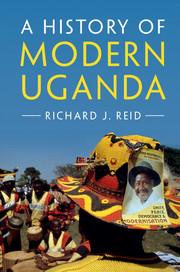Crossref Citations
This Book has been
cited by the following publications. This list is generated based on data provided by Crossref.
Bennett, Alison
2018.
Diplomatic Gifts: Rethinking Colonial Politics in Uganda through Objects.
History in Africa,
Vol. 45,
Issue. ,
p.
193.
Bruce-Lockhart, Katherine
and
Earle, Jonathon L.
2018.
Researching Institutional Life in Modern Uganda.
History in Africa,
Vol. 45,
Issue. ,
p.
175.
Meier zu Selhausen, Felix
van Leeuwen, Marco H. D.
and
Weisdorf, Jacob L.
2018.
Social mobility among Christian Africans: evidence from Anglican marriage registers in Uganda, 1895–2011.
The Economic History Review,
Vol. 71,
Issue. 4,
p.
1291.
Bruce-Lockhart, Katherine
2018.
The Archival Afterlives of Prison Officers in Idi Amin’s Uganda: Writing Social Histories of the Postcolonial State.
History in Africa,
Vol. 45,
Issue. ,
p.
245.
Schoenbrun, David L.
2018.
Crafting Early African Histories with Jan Vansina.
History in Africa,
Vol. 45,
Issue. ,
p.
99.
KHANAKWA, PAMELA
2018.
REINVENTINGIMBALUAND FORCIBLE CIRCUMCISION: GISU POLITICAL IDENTITY AND THE FIGHT FOR MBALE IN LATE COLONIAL UGANDA.
The Journal of African History,
Vol. 59,
Issue. 3,
p.
357.
Mackay, Heather
2019.
Food sources and access strategies in Ugandan secondary cities: an intersectional analysis.
Environment and Urbanization,
Vol. 31,
Issue. 2,
p.
375.
DE HAAS, MICHIEL
2019.
MOVING BEYOND COLONIAL CONTROL? ECONOMIC FORCES AND SHIFTING MIGRATION FROM RUANDA-URUNDI TO BUGANDA, 1920–60.
The Journal of African History,
Vol. 60,
Issue. 3,
p.
379.
Frenz, Margret
2019.
Complicating Decolonisation: Mozambican Indian Experiences in the Twentieth Century.
The Journal of Imperial and Commonwealth History,
Vol. 47,
Issue. 5,
p.
999.
Fisher, Jonathan
2020.
East Africa after Liberation.
Daly, Samuel Fury Childs
2020.
A Nation on Paper: Making a State in the Republic of Biafra.
Comparative Studies in Society and History,
Vol. 62,
Issue. 4,
p.
868.
Bat, Jean-Pierre
2020.
L’Afrique centrale : le nouveau « Grand Jeu ».
Hérodote,
Vol. N° 179,
Issue. 4,
p.
91.
Bwa Mwesigire, Bwesigye
and
Krishnan, Madhu
2021.
Creative Writing as Literary Activism: Decolonial Perspectives on the Writing Workshop.
Eastern African Literary and Cultural Studies,
Vol. 7,
Issue. 1-2,
p.
97.
Tapscott, Rebecca
2021.
Arbitrary States.
p.
98.
Tapscott, Rebecca
2021.
Arbitrary States.
p.
126.
2021.
Arbitrary States.
p.
xiii.
Tapscott, Rebecca
2021.
Arbitrary States.
p.
47.
Tapscott, Rebecca
2021.
Arbitrary States.
p.
188.
2021.
Arbitrary States.
p.
xv.
Tapscott, Rebecca
2021.
Arbitrary States.
p.
17.





